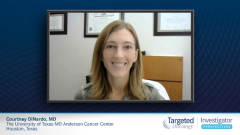
Treatment Options for Newly-Diagnosed AML
Courtney DiNardo, MD, describes how the treatment options for patients with newly diagnosed acute myeloid leukemia differs for patients under and over 60 years of age.
Courtney DiNardo, MD: Hi, everyone. I’m Courtney DiNardo at [The University of Texas] MD Anderson [Cancer Center] in Houston, Texas. Today I’ll be talking about the use of venetoclax in newly diagnosed acute myeloid leukemia [AML].
Treatment has changed so much in terms of opportunities and treatments available for our patients. There’s an age cutoff of 60 years old, which is very arbitrary, so I encourage you not to think about it as a discrimination point but to evaluate the fitness of your patient and the appropriateness of an intensive chemotherapy regimen or a non-intensive chemotherapy regimen. Patients who are appropriate for an intensive chemotherapy regimen are typically younger patients who don’t have underlying comorbidities.
There’s what we call the standard 7+3 therapy, which is 7 days of cytarabine and 3 days of anthracycline. We also have the approval of CPX-351, called Vyxeos. That’s for patients who have therapy-related AML, or AML from an underlying secondary malignancy, whether it’s a solid or different hematologic malignancy. They go on to develop AML or AML with MDS [myelodysplastic syndrome]–related changes. For our intensive chemotherapy–eligible patients who are FLT3 mutated, the standard is intensive chemotherapy with a FLT3 inhibitor. Midostaurin is the recommendation for those patients.
For patients who are older or unfit for intensive chemotherapy because of underlying comorbidities or things of that sort, the standard used to be a hypomethylating agent alone: azacytidine or decitabine primarily in the United States, or a low-dose cytarabine, which is 1 of the old standards and used globally but not often in the United States. Over the past few years, we’ve had approvals of several combinations that have improved the outcome of older individuals. They’re getting low-intensity combinations: azacytidine with venetoclax, decitabine, a hypomethylating agent with venetoclax, and a low-dose cytarabine with glastegib or venetoclax. We don’t use a lot of low-dose cytarabine-based regimens in the United States, but these are approved and available. A recent approval just came through in May: azacytidine with ivosidenib, the IDH1 inhibitor, for patients with newly diagnosed IDH1-mutated AML.
Fitness is a challenging thing to discuss in 1 sentence because we still don’t have a great 1-size-fits-all approach to say who’s fit for intensive chemotherapy. We look at patient age because age is associated with frailty and other comorbidities. In general, individuals over age 70 or 75 are not appropriate for a standard intensive chemotherapy regimen. For patients in their 70s and above, the risk of toxicity from intensive chemotherapy is a challenge; the risks outweigh the benefits. But for younger patients who have underlying comorbidities, especially cardiac or pulmonary comorbidities, or who have a poor performance status—meaning they’re not out of bed more than half of their day—these things are associated with a higher risk of toxicity, morbidity, and mortality to standard intensive chemotherapy. The FDA uses the Ferrara criteria to determine fitness. They include things I’ve talked about: age over 75, underlying cardiac dysfunction, underlying pulmonary dysfunction, poor performance status, or something else that makes the patient a risk for a standard intensive chemotherapy, like an inflammatory bowel disease.
Transcript edited for clarity.











































